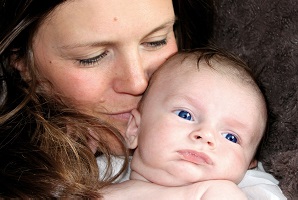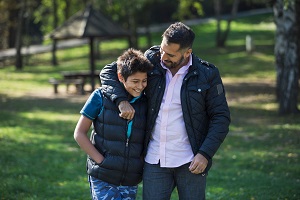Parent and child fostering and caring for unaccompanied asylum seeking children.
Parent and child

The aim of this fostering is to help parents develop their parenting skills in a safe environment.
As a parent and child carer, you would have a baby or child and one or both parents placed in your home, for up to 12 weeks or more. If you're fostering as a couple, one carer must be available full time.
You would not directly look after the child, but you would help and encourage the parent to develop their parenting skills by giving them support and by being a role model. As the foster carer you are ultimately responsible for the safety and wellbeing of the child.
A parent and child foster carer may help the birth parent and the child bond in the crucial early months, to ensure it's safe for them to stay together in the long term.
To be a parent and child carer you'll need to have:
- good communication skills
- patience and understanding of parental challenges
- detailed knowledge of caring for young children
- knowledge of safeguarding
As a parent and child carer you'll be expected to:
- supervise the birth parent and observe how the parent cares for the child
- look after the child in the immediate term if it becomes unsafe for the parent to do so
- keep good notes of what you see and observe
Your notes will be part of our parenting assessment and will help us decide whether the parents can safely keep their child.
Specialist foster carer fees
Parent and child fostering is one of our specialist schemes.
If you decide to become a parent and child foster carer you'll get a linked payment rate which includes fees and age based allowance for both the child or children and their parent. This is because the fee is for the carer to support and guide the parent with their parenting. The carers do not directly care for the children.
You can find more information on our allowances and fees page.
Unaccompanied asylum seeking children

If you're interested in other cultures and helping young people, fostering young asylum seekers could be for you. You'll:
- support them while their asylum claim is considered
- help them make links within the community
- help them access services to overcome any trauma they may have experienced
Bristol County Council is part of a national scheme that aims to provide a safe, supportive home environment to a young person under the age of 18 who is applying for asylum in the UK and has no relatives or guardians in the country.
If you're interested in caring for a young asylum seeker, you'll need to be fully assessed as a foster carer. We'd also expect you to foster other children needing care. Asylum-seeking young people over 16 could also be considered for our Bristol supported lodgings.
There will be specific considerations and legal processes that you'll need to support these children through while they apply for permission to stay in the country.
Lack of information
We may not have a lot of information about these children and young people. They may have travelled with false papers or been told not to reveal much about themselves or their past. They may be reluctant to trust authority figures because of experiences of abuse or hardship. Until that trust develops, it may be difficult to get an accurate picture of what their story and experiences are.
Age disputes
Children assessed at the government screening interview as being under 18 may be a different age from the one they claim, for example 16 rather than 14. We'll decide what age we believe they are before we place them with a foster family. You must treat them as that age.
Language and culture
The child or young person may speak very little or no English. They may feel unsettled because they're far away from everything they're used to. Children may come from countries where social customs, education and culture are very different to those in the UK. Adjusting to a new environment may be difficult for these children and young people.
To help the child or young person feel comfortable, it's important to establish a way to communicate. Use translation and interpreting services as needed and find out as much as possible about their culture, religion, food and customs in their country. Finding things they enjoy doing or are interested in, such as music or sport, might be a good way of bonding with them.
Trauma
The children and young people are likely to have had very traumatic experiences. Some of these experiences may only come to light after they come to stay with you. They:
- will be missing or mourning family and loved ones
- may be anxious and scared about their own safety
- might express their fears and emotional needs in various ways, such as challenging behaviour, sleep issues, eating problems or anxiety
Some may have experienced trauma, but be unable to express this or show any signs of distress. We work with several voluntary and other organisations to support the young person and you when dealing with trauma. These include:
- The Haven, a first stop clinic for newly arrived refugees, who offer medical services on issues such as disturbed sleep or eating
- Thinking Allowed , who offer assessment and support
- Off the Record, who offer information, advice and counselling services to young people in Bristol
We can also help you find appropriate support, mentoring and counselling services.
Education
It may take some time to get the child or young person a place in school. They'll be at home with you until they are so you may need to take some time off work until they are settled. The HOPE Virtual School will support you in this process.
Support for carers of unaccompanied asylum-seeking minors
If you do decide to foster an unaccompanied asylum seeking child or young person, we'll offer you specialist support in addition to the normal support you'd get as a foster carer.
This includes:
- your own social worker
- a social worker for the child
- interpreter support
- mentoring and independent visits for the child, from a visitor not connected to social services
- Legal Aid for the child
- support from Bristol City Council teams in asylum, education, further education, health and therapy
- specialist preparation training and ongoing training that covers subjects such as the asylum process, how to help with trauma and loss, and accessing education, health and other support networks
Find out more
For more information, you can:
- order the Coram BAAF booklet Caring for unaccompanied asylum seeking minors for £4
- visit the Fostering Network webpage about fostering unaccompanied children seeking asylum in the UK
- visit the Refugee Council website
- visit the Refugee Action website
